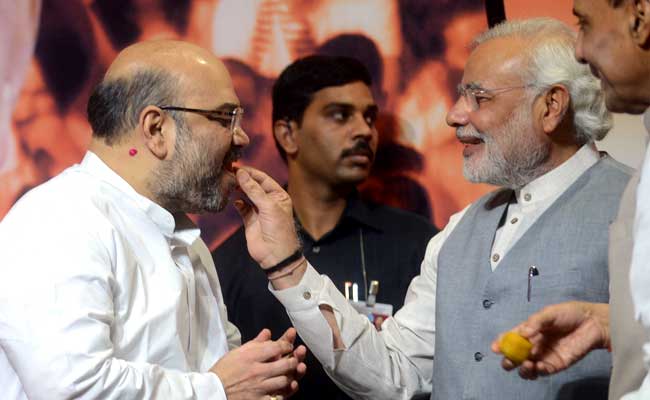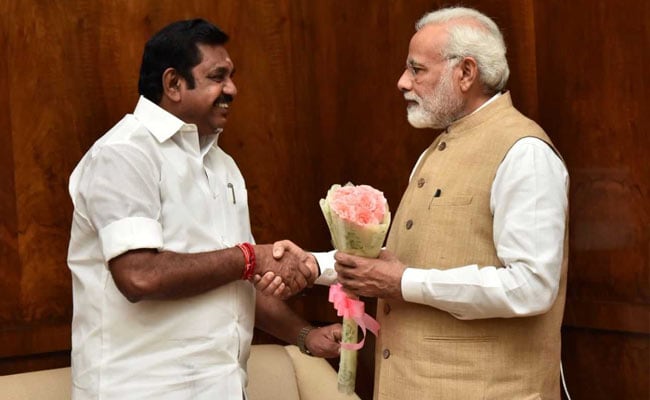Politics is all about winning and retaining power. Compromise is therefore the name of the political game. Stooping to conquer is not an unknown art either. No blame attaches to the powerful, as Tulsidas said. Yet, a few norms apply and the conscientious shrink from making compromises the power-hungry politician will not hesitate to make. The Modi-Shah combine is truly behaving like a pair of power-hungry politicians today.
A few months ago, the Bharatiya Janata Party appeared to be losing the plot. Despite its well-known strengths including a so-called powerful leader, money power and near complete control over the means of communication, parties in the opposition appeared to be getting the better of it. The NDA appeared to be falling apart and opposition parties appeared to be coming together and were increasingly setting the agenda for the elections and the government was failing on more than one front.
But after Balakot, the outlook has changed and the NDA appears to be back in the reckoning. For the opposition parties, as well as the BJP, this election is an existential fight. Many well-known leaders of the opposition parties are already embroiled in serious criminal cases. There is the typical one-sided movement of important leaders from these parties to the BJP; the stock markets have already started celebrating Modi's return to power. On the other hand, BJP leaders are also acutely aware of the fate that awaits them if they lose power. Their survival also therefore depends on the results of these elections. But while the Modi-Shah combine is determined to win the elections at any cost, the opposition parties appear to be lacking that kind of desperation.

BJP chief Amit Shah with PM Narendra Modi (File photo)
The NDA, which was disintegrating, appears to have to come together again. There is no doubt that in alliance-building, the BJP has shown much greater flexibility and a spirit of accommodation than opposition parties. In the 16th Lok Sabha, the BJP was in alliance with 40 parties, big and small. It went out of its way to win over Nitish Kumar in Bihar in July 2017. Nitish Kumar was personally averse to Modi. He had invited the members of the national executive of the BJP who had assembled in Patna for a meeting in 2010 but cancelled the invitation at the last moment because Modi might also have participated in the dinner. He had personally rebuffed Modi's overtures on more than one occasion, even returning the aid which was sent by the government of Gujarat after the disastrous floods in Bihar in 2010. This was all while he was a member of the NDA. Then he formed an alliance with Lalu Prasad Yadav's Rashtriya Janata Dal to comprehensively defeat the BJP in the assembly elections of 2015. Yet, the Modi-Shah combine had no problem eating crow, forgetting the past and aligning with his JD(U) in Bihar. In the last Lok Sabha elections, the BJP won 22 seats in Bihar and placed second in another seven. The JD(U) won only two seats. Yet, the BJP had no problem dividing the Bihar Lok Sabha seats equally between the JD(U) and itself. They are both going to contest 17 seats each in 2019. In addition, it has agreed to give 6 seats to the Lok Jan Shakti party of Ram Vilas Paswan and also a Rajya Sabha seat to him from Assam. Thus, the BJP is not only giving up the seven seats in which it came second but also five seats it had won in 2014. Even if one takes note of the fact that one of the MPs has unfortunately passed away, Kirti Azad has joined the Congress and Shatrughan Sinha will, perhaps on his own, not contest from the BJP, the party will have to deny nomination to at least two loyal MPs in the forthcoming elections and a few others others who may have lost their 2014 contest narrowly.

Nitish Kumar's party Janata Dal (United) has tied-up with BJP to contest polls together in Bihar
As far as Jharkhand is concerned, the BJP has been, for as long as I can remember, contested all 14 Lok Sabha seats in the state. In 2014, it won 12 of these 14. There is not a single seat in Jharkhand which the BJP has not won some time or the other. It has a junior partner in the All Jharkhand Students Union (AJSU), which had won just four seats in alliance with the BJP in the last assembly elections and has never won a single Lok Sabha seat. Yet, the BJP has sacrificed its sitting MP from Giridih, a five-time winner, to give one seat to the AJSU this time. In Tamil Nadu, the BJP has entered into an alliance with AIADMK and a number of other smaller regional parties and settled for just five of 39 seats in that state.

The ruling AIADMK in Tamil Nadu and the BJP have sealed an alliance for the Lok Sabha elections
In Maharashtra, the BJP had been at loggerheads with is oldest ally, the Shiv Sena. The Shiv Sena's attack on the BJP in the recent past had been more vicious than that of its worst critics in the opposition. Yet the BJP made up with the Shiv Sena and gave it 23 Lok Sabha seats in Maharashtra compared to 22 in the 2014 elections. It is busy assiduously wooing its smaller partners in Uttar Pradesh. It has also tied up with the AGP in Assam.
The message that the BJP is sending is loud and clear - it has swallowed its pride, forgotten the humiliations of the past, is prepared to make sacrifices in order to win the forthcoming elections at any cost.
Overcoming their strained ties, the BJP and the Uddhav Thackeray-led Shiv Sena have announced to contest the Lok Sabha and assembly elections together
The BJP is not merely busy building alliances, it is also encouraging defections from other parties which will give it strength for the Lok Sabha elections and cause embarrassment to them. So, it is encouraging defections, by means largely foul, of sitting MLAs of other parties, mainly the Congress, in Karnataka, Gujarat, Maharashtra, West Bengal and other states. This is in line with the practice it has followed in the past. After all, more than 70 of its winning MPs in 2014 had migrated from other parties just before the Lok Sabha elections. Sarbananda Sonowal who became the Chief Minister of Assam in 2016 had joined the BJP only in 2011 and the Deputy Chief Minister of Assam, Himanta Biswa Sarma, joined the BJP only in 2015. Similarly, N. Biren Singh, the Chief Minister of Manipur, joined the BJP only in 2016.
Compared to this, the opposition parties, as I said in a recent tweet, are fighting over non-existent seats, which they may or may not have won in the past and may or may not win this time also.
BJP has given up sitting seats in Bihar and Jharkhand to have alliances. The opposition parties are not ready to compromise even on non existing seats. Good luck to them.
— Yashwant Sinha (@YashwantSinha) March 11, 2019
Let us not forget that UP, Delhi, Haryana and Punjab together account for 120 Lok Sabha seats, not an inconsequential number in a House of 543 where the main opposition parties are likely to contest the elections against each other which will be advantage BJP.
The stakes in this election are very high for the nation. The Modi-Shah combine is practicing a brand of politics which is suicidal for the future of India. Their politics is exclusive and selfish. They have no use for the institutions of democracy, its conventions and practices, its norms and standards. The alliances they are building are purely for winning the elections and wielding power once again. They will go back to their old ways as soon as the elections are over. This is not the time for opposition parties to think in terms of the next assembly elections or expanding their base, however marginally. The Modi-Shah duo must be defeated decisively in 2019 in order to save the country. Nothing less will do.
Yashwant Sinha, former BJP leader, was Minister of Finance (1998-2002) and Minister of External Affairs (2002-2004)
Disclaimer: The opinions expressed within this article are the personal opinions of the author. The facts and opinions appearing in the article do not reflect the views of NDTV and NDTV does not assume any responsibility or liability for the same.


